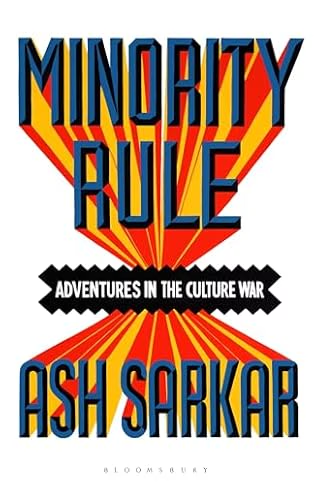Maybe you've read this book, and you feel a sense of despair.
I think before read the book I had a sense of despair. This book did an excellent job of articulating my despair. Articulating ideas that I couldn't put words to on my own.
I bought this book on pre-order after seeing Ash Sarkar on Pod Save the UK. An articulate, intelligent individual with strong opinions, and though I always struggle to read non-fiction, I didn't find this book hard in the way I had expected (sure, still took me a month, but that's pretty good for me).
It's hard to write a review without wanting to just repeat the entire book back to you. If you consider yourself a progressive, left or left leaning, I'd recommend this book. It's definitely not cherry, but it's not angry either. It does the work of laying out what we sort of already know. And importantly it's not anecdotes, around 20%+ of the book are external references that are peppered throughout the main text.
I've highlighted a lot of the content and hope that the messages will stay with me as I feel like her book is a useful tool for arming myself for the political battle we face in the age of 2025.
20 Highlight(s)
Some things - like that there were more excess deaths in England during the hottest day of the summer in 2022 than there were British Forces personnel killed in the Afghanistan and Iraq wars combined - are simply not said at all.
Because if you can't see the world clearly, you can't change it.
But our media and politics leverage the psychological wages of attention in a way that is utterly corrosive and warping.
we have absorbed the tenets of liberal identity politics. We have nurtured a culture that's deeply individualistic, where to be seen as a victim, to be able to claim a marginalised identity position, gives you social capital.
today's identity politics are centred around allyship as opposed to solidarity: and just what that allyship really is, nobody can tell you with any real precision.
I think that lived experience should be allocated the same value as witness testimony in a court trial. It's important, it shouldn't be automatically thrown out and it deserves a fair hearing. But it's not unimpeachable.
To have a name thrust upon you is a feature of your disempowerment.
What's more, the prominence of this debate during a time of indiscriminate military bombardment of one of the most densely populated territories in the world tells us something disquieting: that the lived experience of a minoritised community can be weaponised by political actors to obscure brutal and bloody injustices.
How people feel is important. But it's not as important as a genocide,61 ethnic cleansing or ongoing war crimes.
Fourthly, the threshold for what constitutes news has lowered.
as Seymour observes, 'Whether or not we think we are addicts, the machine treats us as addicts.'
How did a word which should otherwise invite feelings of sympathy, solidarity and welcome become a trigger for repulsion, hostility and suspicion?
To put it bluntly, austerity turned us into a country where the working class went hungry, got sicker and died younger. But it wasn't all bad news. The rich enjoyed a tax cut to the top rate.
Yesterday's chav, incapable of being taught, has become today's working-class white lad languishing at the back of a classroom. What unites these images is the cynicism of those who deploy them - the purpose is not to shine a light on inequality, but to stifle the means by which we talk about it.
According to Human Rights Watch, approximately 1.7 per cent of the world's population is intersex, that is, born with some combination of male and female biological traits.
What makes a woman - or more precisely, what makes us willing to treat someone as a woman - isn't fixed.
If there's a parallel to be drawn between the riots of August 2024 and the riots of August 2011, it's this: happy communities with ample economic opportunities generally don't set their own towns on fire.
Those who had whipped up hatred and suspicion against Britain's minorities in Britain's newspapers aren't poor, and often aren't working class.
I genuinely hope that I haven't bummed you out. Maybe you've read this book, and you feel a sense of despair.
When imprisoned by Mussolini's fascists, the Marxist philosopher Antonio Gramsci wrote that he was 'far from feeling beaten';26 but he was not in denial about his situation either. In a letter penned in his cell, he identified as 'a pessimist because of intelligence, but an optimist because of will'.27 If he could do it, so can you.
